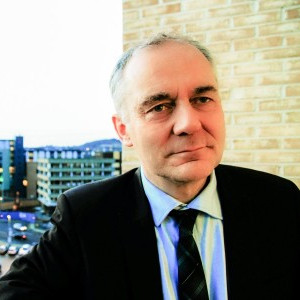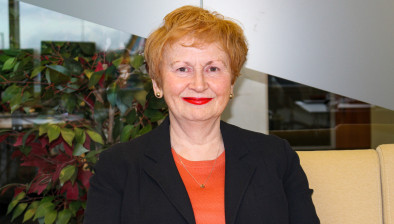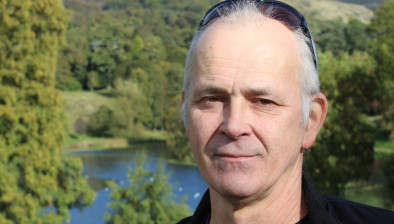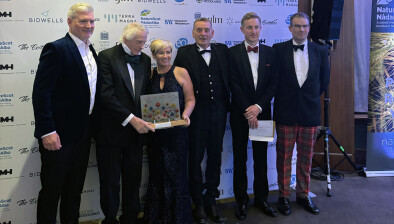Housing Champion: Fanchea Kelly
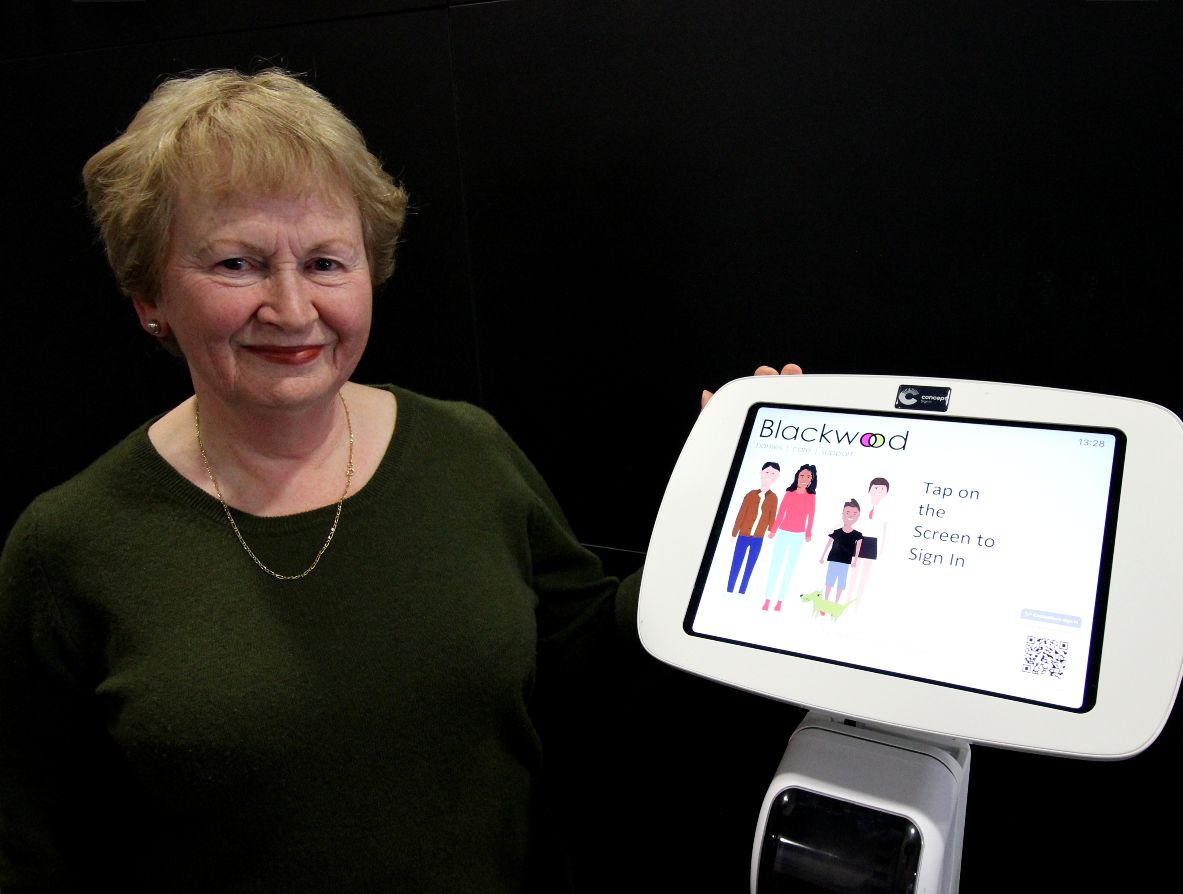
Fanchea Kelly has ensured Blackwood is at the forefront of design and technology innovation (Photo by Jimmy Black)
Fanchea Kelly has been at the centre of events in Scottish housing since the 1980s, and will soon leave Blackwood after a stellar career. Jimmy Black asked her to share some memories with Scottish Housing News.
Over 9,000 miles from Scotland, Fanchea Kelly was sitting in an Australian radio studio in September this year, extolling the virtues of Scottish housing associations, and the great work they do. But just to complicate life, on that same day the First Minister announced a rent freeze. Suddenly, she felt the governance of housing associations was at risk of being totally undermined.
Not just the governance but service delivery and development. Fanchea knew that a rent freeze could take £1 million from Blackwood’s budgets next year. She wrote to all 62 of the MSPs where Blackwood is active about the negative impact on tenants. This is no shrinking violet, and her strong values underpin her work as a housing manager, policy maker and innovator.
Those values came from her parents. Her father spoke often about the 1947 Northern Ireland Education Act, which guaranteed free education for all children over the age of 11. It was, in the words of Professor Graham Walker, “socially progressive, fair, and beneficial to the Catholic minority”.
In a country where many people had been denied basic civil rights, this was formative. It drove a lifelong understanding of the importance of developing knowledge and skills to improve rights.
Fanchea fell in love with Edinburgh after a visit in her teenage years and studied at Edinburgh University. She admits to skipping lectures to wander the city, fascinated by the impact of the built environment on how people lived and felt.
After working in California and Europe, she returned to Edinburgh in 1981 to work on the decant of the notorious Castle Trades lodging house, a place where men slept in cubicles little bigger than the beds they contained. As one former resident told the ‘Herald’… “There was just a bolt on the door and a nail to hang your clothes on… everyone had to be de-loused once a week, and you had to wash your clothes in a bucket.”
Fanchea was employed by Social Work, in a great example of joined-up working between housing and social services, to support the men to settle into their new tenancies.
Some went to Niddrie, others to Dumbiedykes or the Grassmarket, so Fanchea had a unique opportunity to learn about Edinburgh’s housing schemes. She also experienced the strength of communities and found that grim reputations were not always deserved.
It was during this time that Laurie Naumann, the inspirational leader of the Scottish Council for Single Homeless, told Fanchea about the Stirling University Housing course. At Stirling Fanchea studied with course leader Dave Alexander.
Fanchea says: “Dave was always inspiring. He was always up for discussion and encouraged us to think about how we could make things better. While I hated those reports we did for the Chartered Institute of Housing qualification I grudgingly accepted that this was about learning professional disciplines.”
Fanchea went on placement to Glasgow City Council, with influential figures such as Joe Evaskitas and Hamish Allan. They were very progressive in tackling the challenges of homelessness in the city at that time and that left a lasting impression.
Now Fanchea was ready to work in Edinburgh, first with Social Work in improving the standard of supported lodgings and then as a policy officer for the City Council’s housing department. She knew how she wanted to work.
“I was lucky to learn from many talented people who were positive about finding solutions, not simply identifying the scale of problems. With a combination of people who can drive change and make a case convincingly to bring in resources, I learnt how to get things done.”
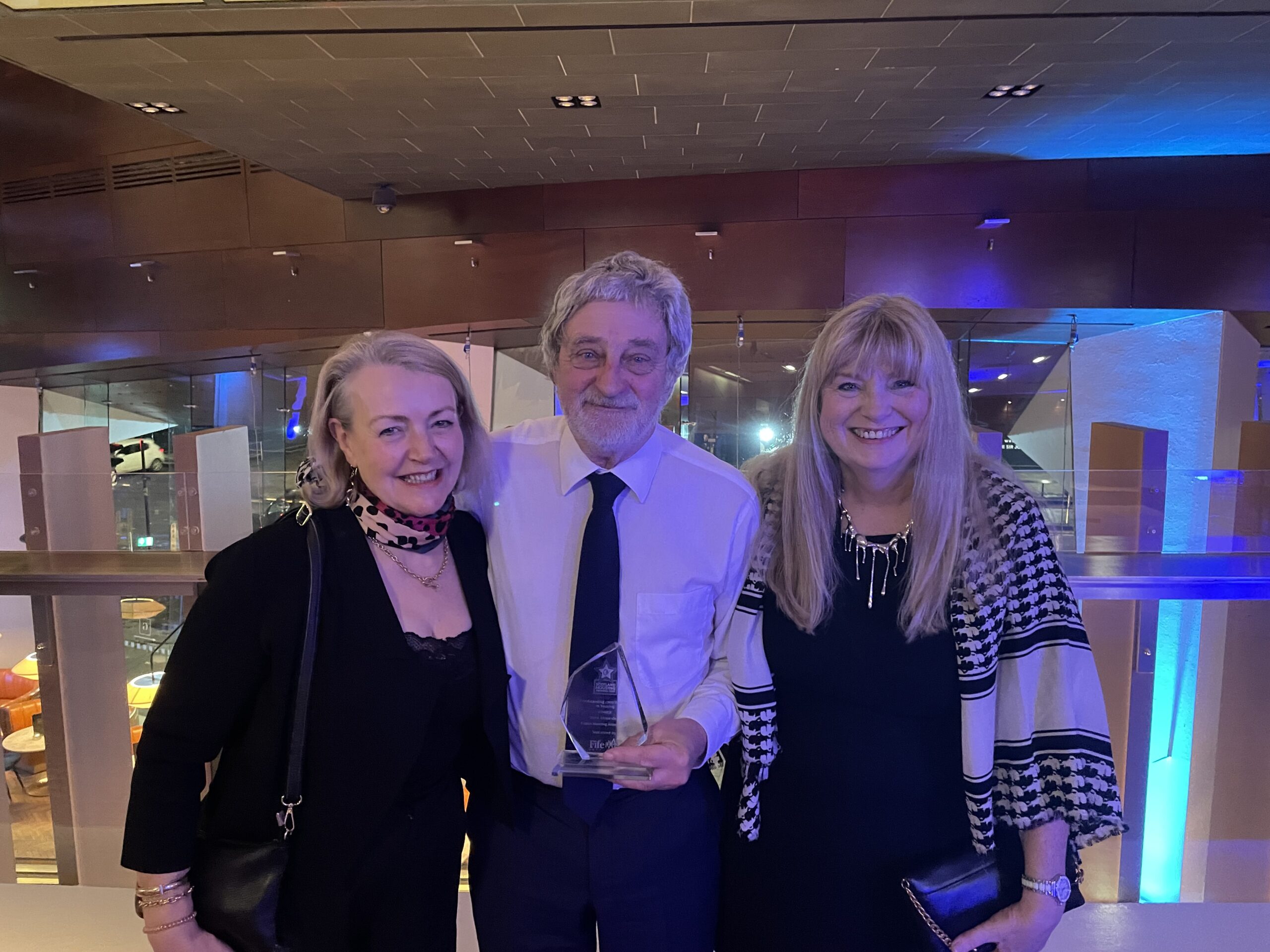
Dave Alexander was recognised for his Outstanding Contribution to Housing this year
This was a time in Edinburgh when there was real potential for change. Labour had taken the City Council and their slogan was “Improving Services, Creating Jobs”. Fanchea recalls councillors such as Norma Jones and Marjorie Bain leading the focus on rundown private rented sector properties, setting standards for houses in multiple occupation and getting grants for tenement improvement.
Fanchea volunteered to get involved in innovative work in Craigmillar, taking down multis and helping to set up the first stock transfer to Hunters Hall Co-op.
Stock transfers in Edinburgh came in the context of previous privatisations; for example the flat-roofed and very run-down estate of West Pilton had been sold off to developers who refurbished and re-roofed the houses and sold them off for low-cost home ownership to aspirational households. These were wryly known as the “boat people”.
Was transferring council homes to an association or co-op the same thing as privatisation? Fanchea recalls that people in Niddrie wanted to stay with the council, but they understood that the resources to regenerate the area were simply not there. As an officer Fanchea learnt that it was not good enough to let tenants live in poor conditions for ideological reasons; leadership from local politicians meant that Hunters Hall Co-op was born.
The standout lesson for Fanchea from her time in Edinburgh was to ‘’plan for the big picture but always engage locally’’.
Next was five years with North Ayrshire Council and the contrast with Edinburgh was marked; low rents, fewer staff, fewer services.
The council was the landlord on the island of Arran. A report by Stirling academic Douglas Robertson set out the scale of second home ownership on Arran and the difficulties that caused for local people with few opportunities for new social housing.
Fanchea’s team worked with the community and Kirk Care HA to develop new homes as part of a stock transfer. “It was a small number, about 35, but a big thing for that island and again showed what working together could do for local people.”
A secondment to ALACHO (Association of Local Authority Chief Housing Officers) followed with Fanchea co-ordinating evidence to the new Parliament for the Housing Scotland Act 2001, which introduced the Scottish Secure Tenancy and enhanced rights for homeless people.
From there Fanchea returned to Edinburgh as Head of Housing Management. This was the era of big stock transfers; Glasgow had already transferred something like 80,000 homes to Glasgow Housing Association, and Edinburgh planned to follow in 2005.
The attraction was that the city’s £300 million housing debt would be paid off by the Government, and there would be a £2 billion investment programme to create 10,000 new homes and regenerate communities.
UNISON termed the proposals “privatisation of an essential public service”, and there was a vigorous campaign by Edinburgh Against Stock Transfer, fuelled by negative publicity emanating from Glasgow Housing Association’s many critics at that time.
The plan was narrowly rejected by tenants in a ballot, so the potential investment didn’t happen. Johnny Gailey of Edinburgh Against Stock Transfer (EAST) told the BBC, “I am pleased the tenants of Edinburgh have seen through the council’s plans to abandon their tenants and privatise their homes.”
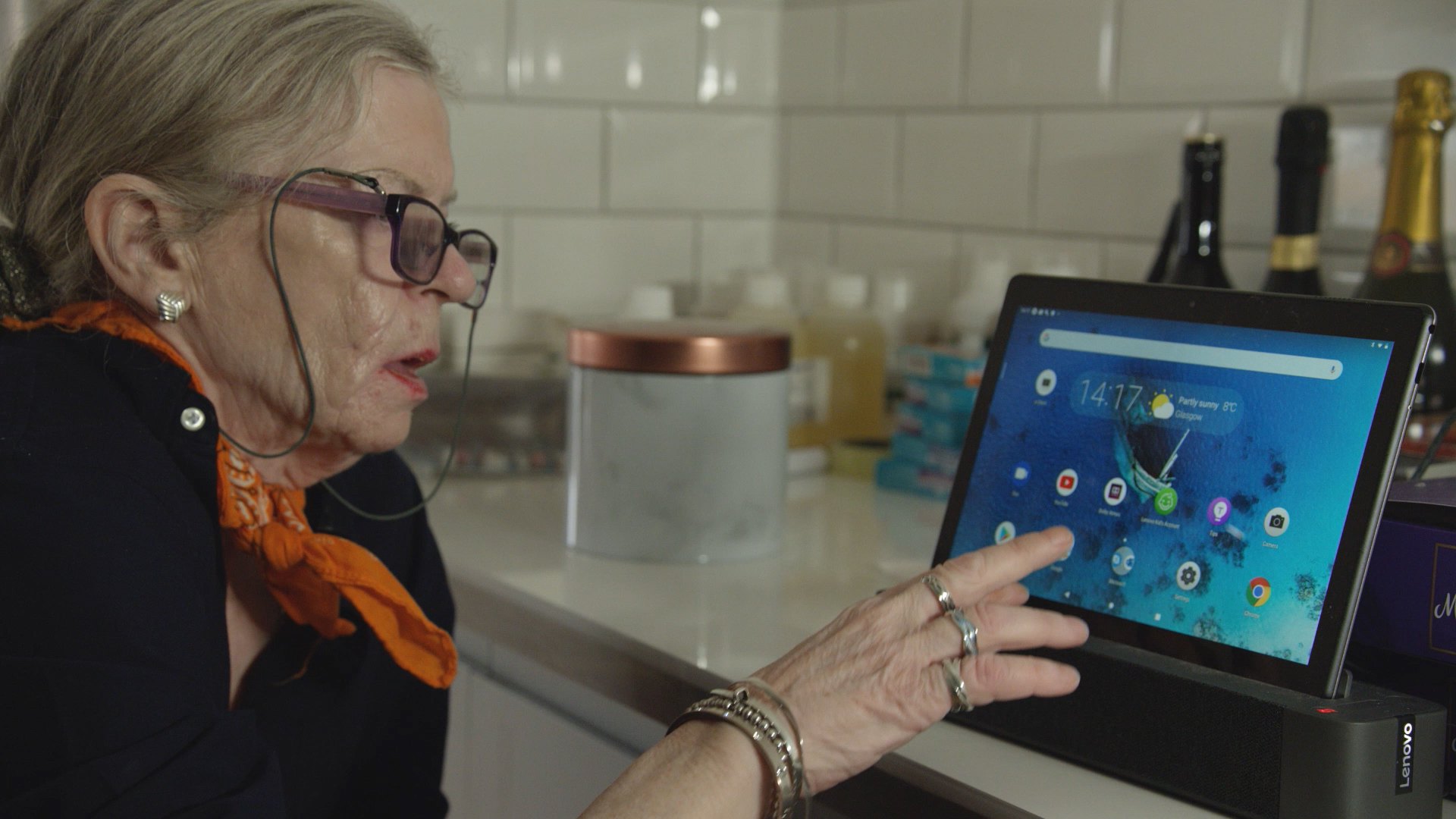
Blackwood's CleverCogs being used by Christine Morrison
Once again Fanchea was offered a secondment – this time by Angiolina Foster to join Communities Scotland as Head of Inspection. Adding this very different regulatory role to her experience Fanchea now understood the impact of positive leadership on delivery of services – whether at senior officer or Board or political levels, and enjoyed engaging across Scotland.
However, she preferred being hands-on to deliver change and this soon led to her becoming director of strategy for Glasgow Housing Association at a turbulent time for the organisation.
GHA had been set up with the intention of transferring its 80,000 homes to community-based landlords. The rules around this specified that any transfers had to be financially neutral for GHA and the new landlords; GHA appeared reluctant to let any of its houses go, and there was a stalemate on how to move forward.
“The £1 billion investment radically transformed many communities in Glasgow and was so necessary. The conundrum was that investing and running programmes while actively disposing of the organisation was an almost impossible human task, regardless of commitment or intent” says Fanchea. “We worked with consultants, tenants, politicians, and stakeholders to develop a collaborative set of principles to work out what could happen and what could not. We tried to make sure discussions were not fixed on any one perspective. So the transfers which could happen took place and, with support from tenants, Glasgow Housing Association had a future to contribute to the city’s housing strategy.”
Fanchea believes that Martin Armstrong, the chief executive officer at GHA built critically important trust with tenants and staff to enable the changes to happen. “Martin’s leadership was outstanding. There were so many committed and talented people that it was brilliant to be part of delivering services for customers with new energy and confidence.”
But as her job at GHA then became more operational Fanchea decided it was time to move on.
Leaving a job without knowing what comes next is always brave, but Fanchea did not have to wait long before the opportunity at Blackwood appeared. She saw a chance to build strategic value on a totally different scale and for a different purpose.
“I spent time exploring what is possible, taking advice, talking with the Board, asking ourselves what our unique purpose was. Again, my inspiration came from listening to what people wanted for their future.
“A tenant board member, Lizanne Burton, showed me how new adaptations such as the rise and fall worktop in her kitchen helped her retain her independence. So things which were impossible for her ten years previously were now open to her. That made me think about what new things she might be able to do in the next ten years. Other tenants used simple technology to solve their issues of accessibility that wasn’t even on my radar.
Blackwood made a strategic commitment to innovation using design and technology. Fundamentally it was about creating solutions with people so they could live independently.
Blackwood’s tablet-based Clever Cogs system enables residents to control their homes, communicate with staff and use the internet. The organisation has found ways to help people overcome doubts about technology. One man started using a specially adapted stylus for Clever Cogs when he realised he could order his night-time tipple through the tablet. Digital coaches help people learn new skills and do things for themselves.
Sup Spoon creator Grant Douglas (right) at the 2015 Blackwood Design Awards
Then there’s the no spills sup spoon, now displayed in the V&A in Dundee, developed by a disabled man, a winner in the Blackwood Design Awards, which promotes tech concepts and products to enable independent living.
The ‘Blackwood House’ is highly accessible, beautiful, connected, and affordable and aims to influence the standard of accessible housing in Scotland.
Innovations come together in the UK-funded Peoplehood programme, whose purpose is to “co-create beautiful places for independent living where people can live healthier and happier lives.”
So Blackwood is at the forefront of design and technology innovation to help people live life to the full, while ensuring standards of service delivery. Fanchea says: “I’m really proud of what Blackwood does, and it seems the right time to move on and give someone else a chance to take it in new directions.”
Fanchea is not retiring and is considering her plans for her next stage. She knows only that she wants to do something new and different. She will still enjoy wild places – Fanchea has climbed over 200 Munros and quite a few Corbetts, sometimes in the company of her old course leader, Dave Alexander. She will still swim, play padel tennis, and enjoy Donegal with family and friends.
She continues her involvement with the Housing Rights charity in Northern Ireland and is on the board of the Observatory for Sport in Scotland, which builds evidence for greater access to, and enjoyment of, sports and activity.
But whatever the new and different thing turns out to be, it must include fun. Her advice for life? “Do good things with the right people and have fun.”




